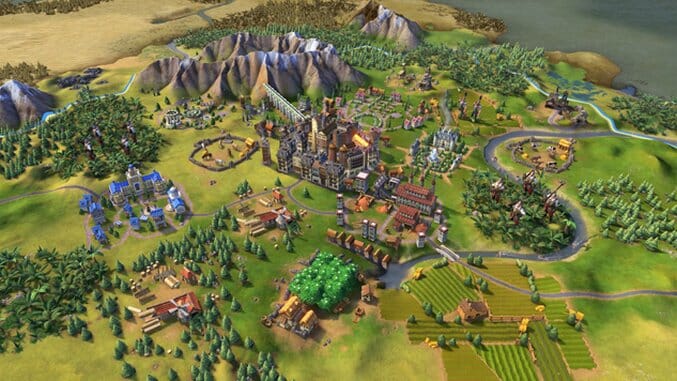
Following the release of Civilization: Beyond Earth, there was a lot to be disappointed about in terms of the game’s inability to separate itself from the base Civilization games or improve on the original formula. Initially it did not bode well for Civilization VI, but as I was shown with the game preview I was given last month, the changes coming to this upcoming latest iteration in the series are smart and sensible, reinforcing the game’s core values without completely reinventing them.
Of all the changes coming, here are the most significant.
The Diplomacy System is More Complex
Among the chief complaints about the Civilization series is that their Diplomacy system is too vague and unpredictable, forcing players to adopt strategies and achieve a win state without it. Some refinements were made in Civilization: Beyond Earth, laying the groundwork for Civilization VI, where some of the ambiguity has been cleared up with new dialogue and trade options.
For instance, when laying down the bargaining chips for strategic resources, you will now have a list of all your tradeable resources, and can quickly add or remove them with the click of a mouse, adjusting until you reach agreeable terms. Declaring war also has a new Cassus Belli option, which will allow you to declare war on another civilization with reduced impact on your world reputation; ex: If a civilization breaks a promise to not proselytize in your country, you can declare war on them based on ideological terms and not take as big of a hit with other world leaders.
One of the most helpful changes is also the least obtrusive: world leaders will be represented as an avatar in the upper right hand corner of the screen and accompanied by a small emoticon indicated your current status with them. As each turn is completed the avatar will bob up or down depending on if your recent actions improved or harmed your relationship with them, keying you in to how decisions are affecting your status on a constant basis. Finally, Diplomacy can actually be used to your strategic advantage.
Districts Will Place Limitations on Where and What You Can Build
In the past, the cities of your civilization could hold all the buildings needed sustain it within the tile of the city itself. You never had to worry about having enough land, because even World Wonders didn’t take up any additional space. With the addition of Districts, how your land is used will now be a huge factor in what and where you’re able to build; all financial buildings have to be built in the Financial District, all the entertainment buildings in Entertainment District, and so on. The real fun part is how these limitations are imposed on the conditions of building World Wonders. Not only will World Wonders take up their own tile, they also have very specific building requirements attached. For example Ruhr Valley must be adjacent to both a river and an Industrial District, with a prerequisite of one Factory. The changes add an entire new facet to strategic use of land while also making just enough thematic sense that you can’t even be mad about it.
Workers are No Longer Permanent Units
The end game of Civilization V was often plagued by the inevitable problem of what to do with your workers. Left to their own devices in Auto mode, they couldn’t be trusted to make the best tile improvements. But micromanaging every single one for a few hundred turns was exhausting. Eventually some would have to be erased to save on the per turn maintenance fees. That’s all changed in Civilization VI, where the Workers, like the Explorer units of Beyond Earth, can only be used a limited number of times (initially three but this can be expanded). They also make tile improvements instantaneously, meaning you no longer have to worry about how long it will take to build or improve a resource. Among all the adjustments made to Civilization, this one is a huge game changer.
The Technology Tree is Now Split in Two Sections, Tech and Civics
The driving mechanism behind each civilization’s progress is their development of technology. In the past this was represented by a simple tree with a series of branching, interdependent tech advancements, which players could research over several turns in order to reap their associated benefits.
In Civilization VI there are now two trees to manage, Tech and Civics. Each have their own advancements to choose from, and all can be “boosted” (that is, given a dramatic reduction in necessary turns) by achieving small, related goals within the game. It doesn’t require a huge adjustment in strategy, but it will factor heavily into your civilization’s advancement in culture, science, and military, so plan carefully.
The Social Policies System has been Completely Overhauled
Perhaps the biggest change to Civilization’s latest entry in the series has been the Social Policy system, which only somewhat resembles its predecessor in Civilization V. At its core, it’s still driven by pursuing specific ideologies and awarding various benefits through an accumulation of culture, however these benefits are now represented by cards of varying categories, the use of which are determined by the type of government your civilization has. For example an Autocracy allows for two Military, one Economic, one Diplomatic, and one “Wildcard” policy. They can be switched out to suit your civilization’s needs for a fee, or changed for free when a new card is obtained through researching tech or civics. As in the past, various Governments will only become available as certain culture or technological milestones are achieved. If you’ve played a lot of Civilization V, many of the card policies will look very familiar so it should be easy to adjust as you learn to mix and match to achieve the best balance for your civilization’s needs.


